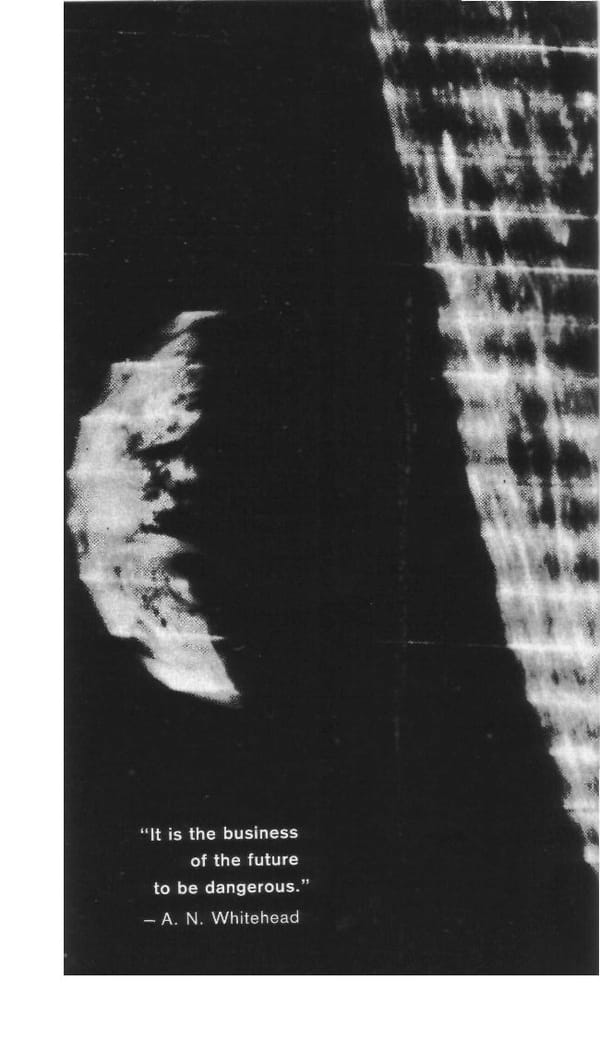The Medium Is The Massage - Marshall McLuhan
Societies have always been shaped more by the nature of media by which men communicate than by the content of communication. This classic book predicts it!
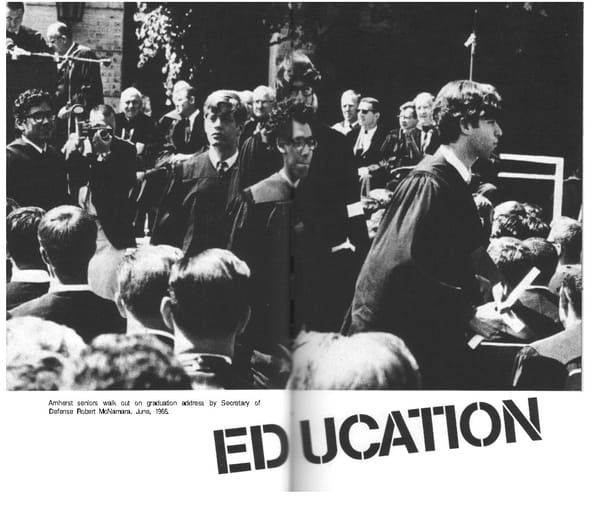
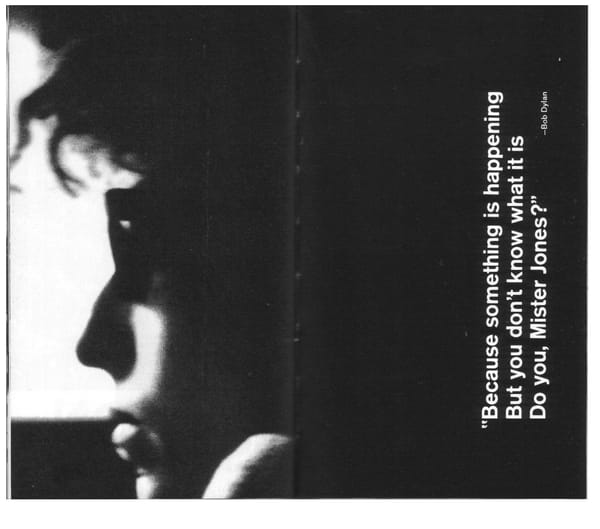
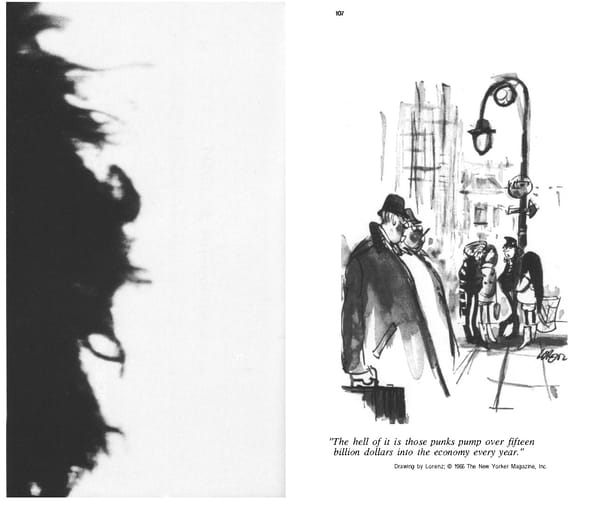
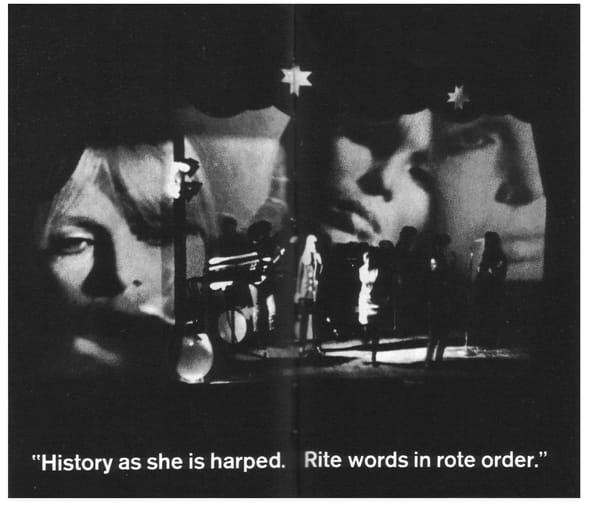

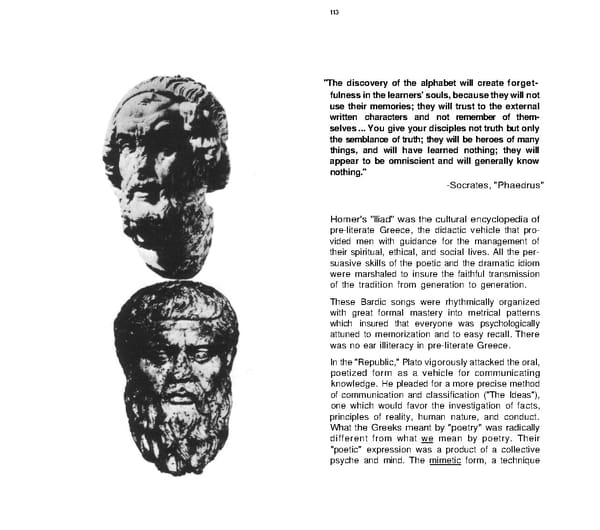
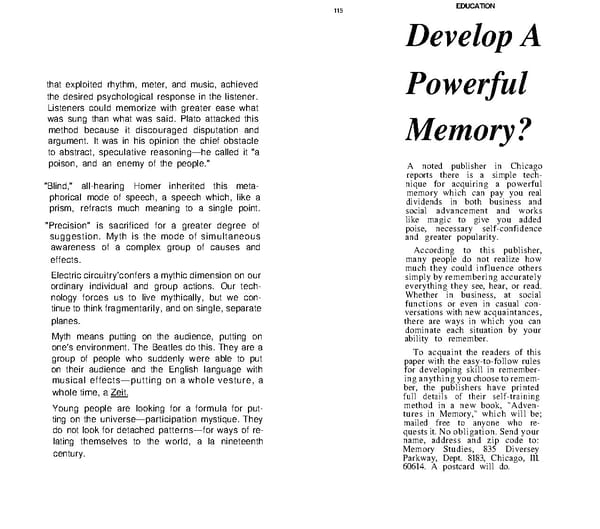
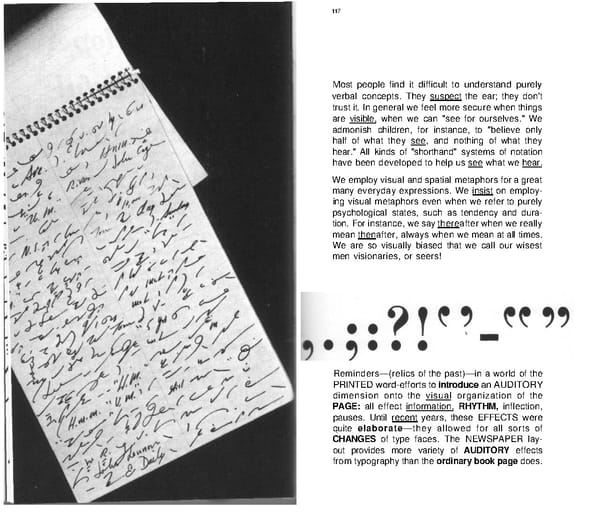
The medium, or process, of our time—electric tech nology—is reshaping and restructuring patterns of social interdependence and every aspect of our personal life. It is forcing us to reconsider and re evaluate practically every thought, every action, and every institution formerly taken for granted. Everything is changing—you, your family, your neighborhood, your education, your job, your gov ernment, your relation to "the others." And they're changing dramatically. Societies have always been shaped more by the nature of the media by which men communicate than by the content of the communication. The alphabet, for instance, is a technology that is ab sorbed by the very young child in a completely unconscious manner, by osmosis so to speak. Words and the meaning of words predispose the child to think and act automatically in certain ways. The alphabet and print technology fostered and encouraged a fragmenting process, a process of specialism and of detachment. Electric technology fosters and encourages unification and involve 30million toy trucks were bought in the U.S. in 1966. ment. It is impossible to understand social and cultural changes without a knowledge of the work ings of media. Anxiety" is, in great part, the result of trying to do today's job with yesterday's toolswith yester The older training of observation has become quite day's concepts. irrelevant in this new time, because it is based on psychological responses and concepts conditioned Youth instinctively understands the present en by the former technology—mechanization. vironmentthe electric drama. It lives mythically and in depth. This is the reason for the great Innumerable confusions and a profound feeling alienation between generations. Wars, revolutions, of despair invariably emerge in periods of great civil uprisings are interfaces within the new en technological and cultural transitions. Our "Age of vironments created by electric informational media.
10 " In the study of ideas, it is necessary to remember that insistence on hardheaded clarity issues from sentimental feeling, as it were a mist, cloaking the perplexities of fact. Insistence on clarity at all costs is based on sheer superstition as to the mode in which human intelligence functions. Our reason ings grasp at straws for premises and float on gossamers for deductions." —A. N. Whitehead, "Adventures in Ideas." Our time is a time for crossing barriers, for erasing old categories—for probing around. When two seemingly disparate elements are imaginatively poised, put in apposition in new and unique ways, startling discoveries often result. Learning, the educational process, has long been associated only with the glum. We speak of the "serious" student. Our time presents a unique opportunity for learning by means of humor—a perceptive or incisive joke can be more meaning ful than platitudes lying between two covers. "The Medium is the Massage" is a lookaround to see what's happening. It is a collideoscope of interfaced situations. Students of media are persistently attacked as evaders, idly concentrating on means or processes rather than on "substance." The dramatic and rapid changes of "substance" elude these accusers. Survival is not possible if one approaches his environment, the social drama, with a fixed, un changeable point of view—the witless repetitive response to the unperceived.
you How much do you make? Have you ever contemplated suicide? Are you now or have you ever been... ? Are you aware of the fact...? I have here be fore me.... Electrical information de vices for universal, tyrannical wombto tomb surveillance are causing a very serious dilemma between our claim to privacy and the community's need to know. The older, traditional ideas of private, isolated thoughts and actions— the patterns of mechanistic technolo gies—are very seriously threatened by new methods of instantaneous electric information retrieval, by the electrically computerized dossier bank—that one big gossip column that is unforgiving, unforgetful and from which there is no redemption, no erasure of early "mis takes." We have already reached a point where remedial control, born out of knowledge of media and their total effects on all of us, must be exerted. How shall the new environment be pro grammed now that we have become so involved with each other, now that aM of us have become the unwitting work force for social change? What's that buzzzzzzzzzzzzzzzzzzzzzzzzzzzzzzzzing? 12
your family The family circle has widened. The worldpool of information fathered by electric media—movies, Telstar, flight far surpasses any possible influence mom and dad can now bring to bear. Character no longer is shaped by only two earnest, fumbling experts. Now all the world's a sage. 14
your neighborhood Electric circuitry has overthrown the regime of "time" and "space" and pours upon us instantly and continuously the concerns of all other men. It has re constituted dialogue on a global scale. Its message is Total Change, ending psychic, social, economic, and political parochialism. The old civic, state, and national groupings have become un workable. Nothing can be further from the spirit of the new technology than "a place for everything and everything in its place." You can't go home again. 16
your education There is a world of difference between the modern home environment of inte grated electric information and the classroom. Today's television child is attuned to uptotheminute "adult" news—inflation, rioting, war, taxes, crime, bathing beauties —and is bewildered when he enters the nine teenthcentury environment that still characterizes the educational estab lishment where information is scarce but ordered and structured by frag mented, classified patterns, subjects, and schedules. It is naturally an en vironment much like any factory setup with its inventories and assembly lines. The "child" was an invention of the seventeenth century; he did not exist in, say, Shakespeare's day. He had, up until that time, been merged in the adult world and there was nothing that could be called childhood in our sense. Today's child is growing up absurd, be cause he lives in two worlds, and neither of them inclines him to grow up. Grow ing up—that is our new work, and it is total. Mere instruction will not suffice. 18
your job "When this circuit learns your job, what are you going to do?" "Jobs" represent a relatively recent pattern of work. From the fifteenth century to the twentieth century, there is a steady progress of fragmentation of the stages of work that constitute "mechanization" and "specialism." These procedures cannot serve for sur vival or sanity in this new time. Under conditions of electric circuitry, all the fragmented job patterns tend to blend once more into involving and demanding roles or forms of work that more and more resemble teaching, learning, and "human" service, in the older sense of dedicated loyalty. Unhappily, many wellintentioned politi cal reform programs that aim at the alleviation of suffering caused by un employment betray an ignorance of the true nature of mediainfluence. "Come into my parlor," said the com puter to the specialist. 20
your government Nosecounting, a cherished part of the eighteenthcentury fragmentation proc ess, has rapidly become a cumber some and ineffectual form of social assessment in an environment of in stant electric speeds. The public, in the sense of a great consensus of separate and distinct viewpoints, is finished. To day, the mass audience (the successor to the "public") can be used as a cre ative, participating force. It is, instead, merely given packages of passive en tertainment. Politics offers yesterday's answers to today's questions. A new form of "politics" is emerging, and in ways we haven't yet noticed. The living room has become a voting booth. Participation via television in Freedom Marches, in war, revolution, pollution, and other events is changing everything. 22
"the others" The shock of recognition! In an elec tric information environment, minority groups can no longer be contained— ignored. Too many people know too much about each other. Our new en vironment compels commitment and participation. We have become irrevo cably involved with, and responsible for, each other. 24
26 All media work us over completely. They are so pervasive in their personal, political, economic, aesthetic, psychological, moral, ethical, and social consequences that they leave no part of us un touched, unaffected, unaltered. The medium is the massage. Any understanding of social and cultural change is impossible without a knowledge of the way media work as environments. All media are extensions of some human faculty— psychic or physical.
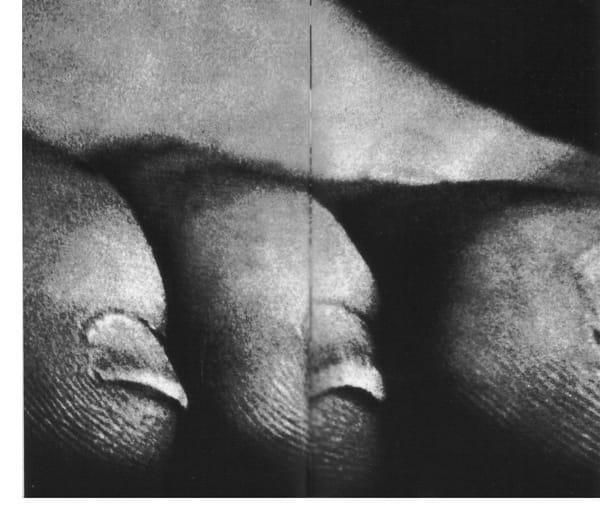
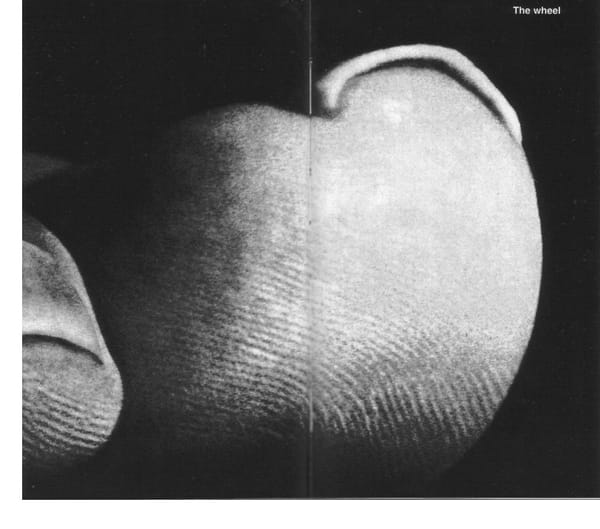
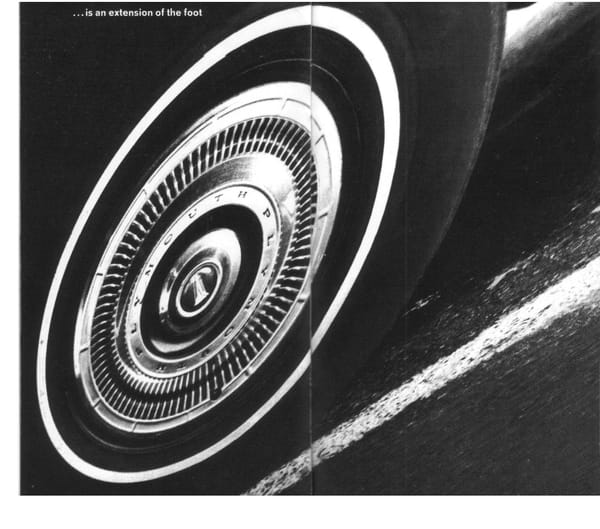
the book
is an extension of the eye...
clothing, an extension of the skin...
electric circuitry, 41 an extension of Media, by altering the environment, evoke in us unique ratios of sense perceptions. The extension of any one sense alters the way we think and act— the the way we perceive the world. central When these nervous ratios change, system men change.
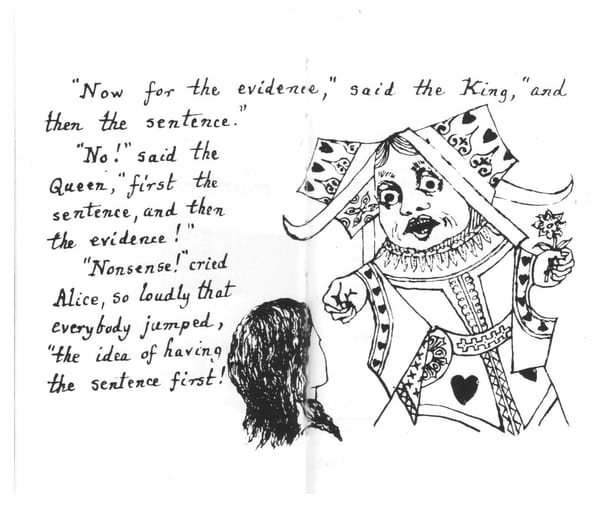
45 The dominant organ of sensory and social orienta became the organizing principle of life. "As we tion in prealphabet societies was the ear— begin, so shall we go." "Rationality" and logic "hearing was believing." The phonetic alphabet came to depend on the presentation of connected forced the magic world of the ear to yield to the and sequential facts or concepts. neutral world of the eye. Man was given an eye For many people rationality has the connotation for an ear. of uniformity and connectiveness. "I don't follow Western history was shaped for some three thou you" means "I don't think what you're saying is sand years by the introduction of the phonetic rational." alephbet, a medium that depends solely on the eye Visual space is uniform, continuous, and con for comprehension. The alphabet is a construct of nected. The rational man in our Western culture fragmented bits and parts which have no semantic is a visual man. The fact that most conscious ex meaning in themselves, and which must be strung perience has little "visuality" in it is lost on him. together in a line, beadlike, and in a prescribed order. Its use fostered and encouraged the habit Rationality and visuality have long been inter of perceiving all environment in visual and spatial changeable terms, but we do not live in a primarily terms—particularly in terms of a space and of a visual world any more. time that are uniform, The fragmenting of activities, our habit of thinking c,o,n,t,i,n,u,o,u,s in bits and parts—"specialism"—reflected the step and bystep linear departmentalizing process inherent connected. in the technology of the alphabet. The line, the continuum — this sentence is a prime example "The eye—it cannot choose but see; we cannot bid the ear be still; our bodies feel, where'er they be, against or with our will." —Wordsworth

48 Until writing was invented, man lived in acoustic space: boundless, directionless, horizonless, in the dark of the mind, in the world of emotion, by primordial intuition, by terror. Speech is a social chart of this bog. The goose quill put an end to talk. It abolished mystery; it gave architecture and towns; it brought roads and armies, bureaucracy. It was the basic metaphor with which the cycle of civilization be gan, the step from the dark into the light of the mind. The hand that filled the parchment page built a city. Whence did the wond'rous mystic art arise, Of painting SPEECH, and speaking to the eyes? That we by tracing magic lines are taught, How to embody, and to colour THOUGHT?
50 Printing, a ditto device Printing, a ditto device Printing, a ditto device confirmed and extended the new visual stress. It provided the first uniformly repeatable "commodity," the first as sembly line—mass production. It created the portable book, which men could read in privacy and in isolation from others. Man could now inspire—and conspire. Like easel painting, the printed book added much to the new cult of individualism. The private, fixed point of view became possible and literacy con ferred the power of detachment, noninvolvement. Printing, a ditto device Printing, a ditto device Printing, a ditto device Printing, a ditto device Printing, a ditto device Printing, a ditto device Printing, a ditto device Printing, a ditto device
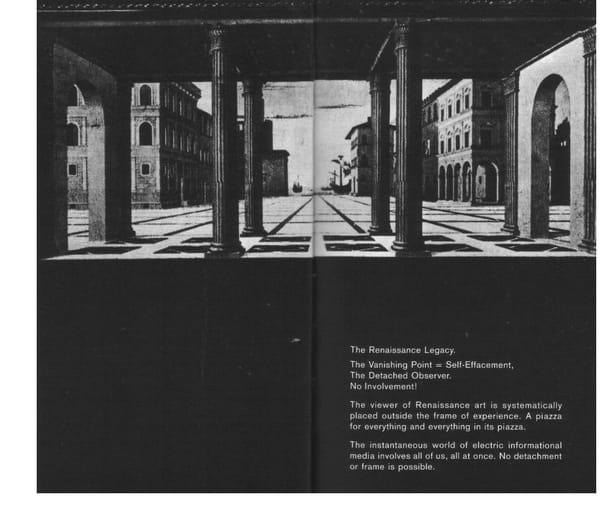
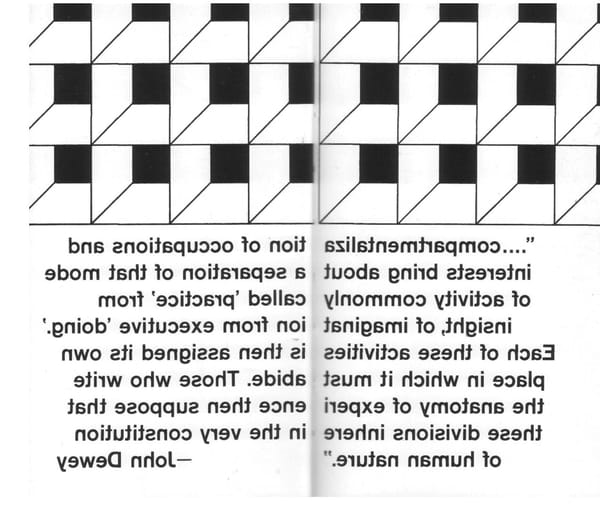

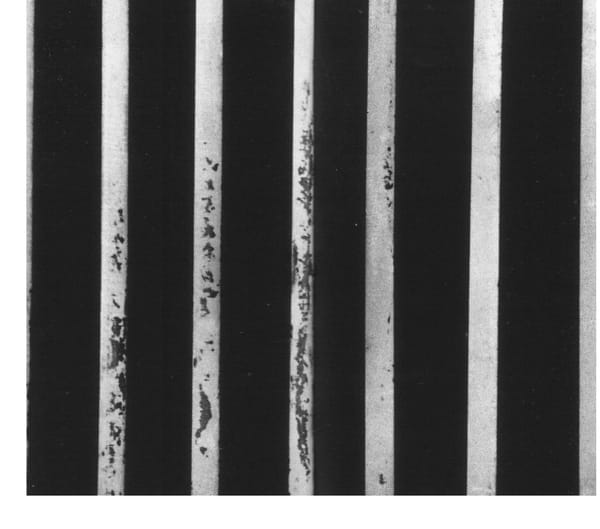
61 "A cell for citters to cit in." The idea of detention in a closed space as a form of human punitive corrective action seems to have come in very much in the thirteenth and fourteenth centuries—at the time perspective and pictorial space was developing in our Western world. The whole concept of enclosure as a means of con straint and as a means of classifying doesn't work as well in our electronic world. The new feeling that people have about guilt is not something that can be privately assigned to some individual, but is, rather, something shared by everybody, in some mysterious way. This feeling seems to be returning to our midst. In tribal societies we are told that it is a familiar reaction, when some hideous event occurs, for some people to say, "How horrible it must be to feel like that," instead of blaming some body for having done something horrible. This feel ing is an aspect of the new mass culture we are moving into—a world of total involvement in which everybody is so profoundly involved with every body else and in which nobody can really imagine what private guilt can be anymore.
63 Ours is a brandnew world of allatonceness. "Time" has ceased, "space" has vanished. We now live in a global village...a simultaneous happening. We are back in acoustic space. We have begun again to structure the primordial feeling, the tribal emo tions from which a few centuries of literacy divorced us. We have had to shift our stress of attention from action to reaction. We must now know in advance the consequences of any policy or action, since the results are experienced without delay. Because of electric speed, we can no longer wait and see. George Washington once remarked, "We haven't heard from Benj. Franklin in Paris this year. We should write him a letter." At the high speeds of electric communication, purely visual means of apprehending the world are no longer possible; they are just too slow to be relevant or effective. Unhappily, we confront this new situation with an enormous backlog of outdated mental and psycho logical responses. We have been left dan gling. Our most impressive words and thoughts betray us—they refer us only to the past, not to the present. Electric circuitry profoundly involves men with one another. Information pours upon us, instantane ously and continuously. As soon as information is acquired, it is very rapidly replaced by still newer information. Our electricallyconfigured world has forced us to move from the habit of data classifica tion to the mode of pattern recognition. We can no longer build serially, blockbyblock, stepbystep, because instant communication insures that all factors of the environment and of experience co exist in a state of active interplay.
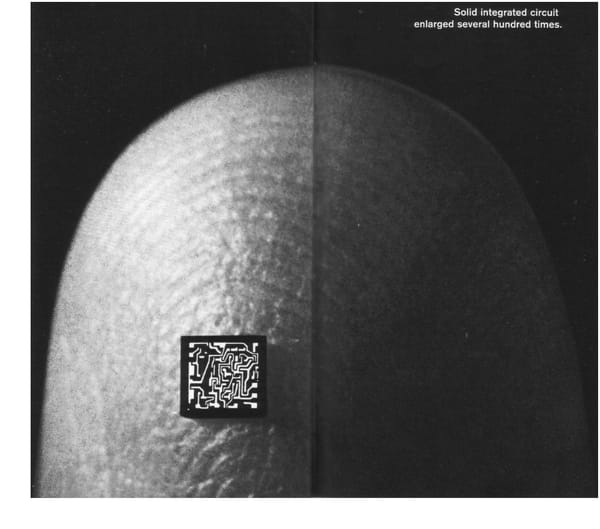
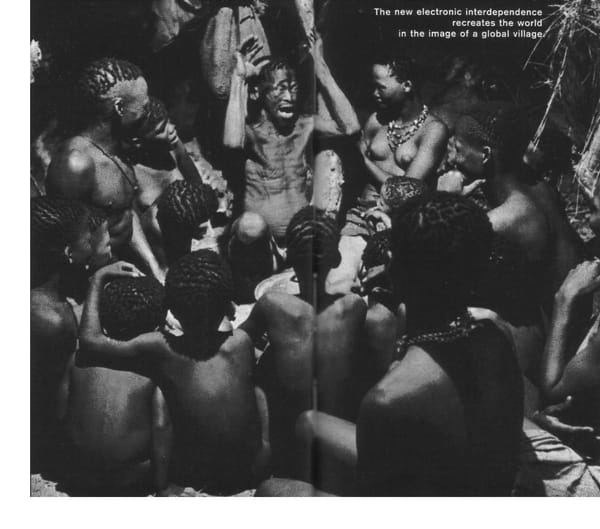
69 We have now become aware of the possibility of that we abandon the luxury of this posture, this arranging the entire human environment as a work fragmentary outlook. of art, as a teaching machine designed to maximize The method of our time is to use not a single but perception and to make everyday learning a proc multiple models for exploration—the technique of ess of discovery. Application of this knowledge the suspended judgment is the discovery of the would be the equivalent of a thermostat controlling twentieth century as the technique of invention room temperature. It would seem only reasonable was the discovery of the nineteenth. to extend such controls to all the sensory thresh olds of our being. We have no reason to be grate ful to those who juggle these thresholds in the name of haphazard innovation. An astronomer looking through a 200inch tele scope exclaimed that it was going to rain. His assistant asked, "How can you tell?" "Because my corns hurt." Environments are not passive wrappings, but are, rather, active processes which are invisible. The groundrules, pervasive structure, and overall pat terns of environments elude easy perception. Anti environments, or countersituations made by artists, provide means of direct attention and enable us to see and understand more clearly. The interplay between the old and the new environments cre ates many problems and confusions. The main obstacle to a clear understanding of the effects of the new media is our deeply embedded habit of regarding all phenomena from a fixed point of view. We speak, for instance, of "gaining perspec tive." This psychological process derives uncon sciously from print technology. Print technology created the public. Electric tech nology created the mass. The public consists of separate individuals walking around with separate, fixed points of view. The new technology demands
70 "It isn't that I don't like current events. There have just been so many of them lately."
72 The end of the line. The railway radically altered the personal outlooks and patterns of social interdependence. It bred and nurtured the American Dream. It created to tally new urban, social, and family worlds. New ways of work. New ways of management. New legislation. The technology of the railway created the myth of a green pasture world of innocence. It satisfied man's desire to withdraw from society, symbolized by the city, to a rural setting where he could recover his animal and natural self. It was the pas toral ideal, a Jeffersonian world, an agrarian de mocracy which was intended to serve as a guide to social policy. It gave us darkest suburbia and its lasting symbol: the lawnmower. The circuited city of the future will not be the huge hunk of concentrated real estate created by the railway. It will take on a totally new meaning under conditions of very rapid movement. It will be an information megalopolis. What remains of the con figuration of former "cities" will be very much like World's Fairs—places in which to show off new technology, not places of work or residence. They will be preserved, museumlike, as living monu ments to the railway era. If we were to dispose of the city now, future societies would reconstruct them, like somany Williamsburgs.

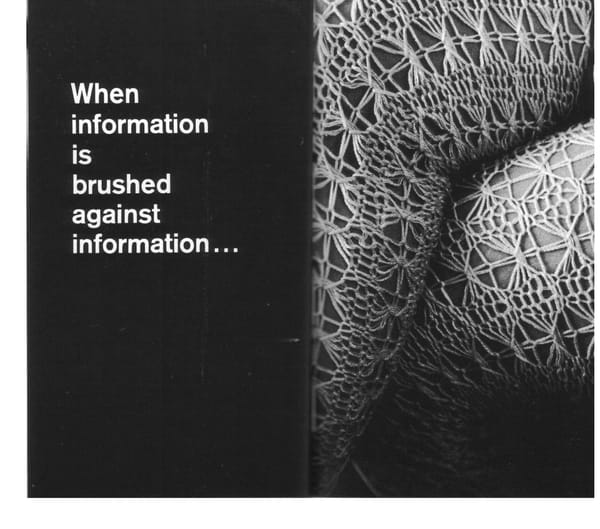
The stars are so big, The Earth is so small, Stay as you are. the results are startling and effective. The peren nial quest for involvement, fillin, takes many forms.

enviro
Environments are invisible. Their groundrules, pervasive structure, and overall patterns elude easy perception.
The Fairmount Water Works in Philadelphia, Penna. We impose the form of the old on the content of the new. The malady lingers on. nment
The poet, the artist, the sleuth —whoever sharpens our perception tends to be antisocial; rarely "well adjusted," he cannot go along with currents and trends. A strange bond often exists among anti social types in their power to see environments as they really are. This need to interface, to con front environments with a certain antisocial power, is manifest in the famous story, "The Emperor's New Clothes." "Welladjusted" courtiers, having vested interests, saw the Emperor as beautifully appointed. The "antisocial" brat, unaccustomed to the old environment, clearly saw that the Emperor "ain't got nothin' on." The new environment was clearly visible to him.

92 Sneed Martin, Larson E. Whipsnade, Chester Snavely, A. Pismo Clam, J. P. Pinkerton Snoop ington, Mahatma Kane Jeeveshe was always the man on the flying trapeze. On the stage, on the silver screen, all through his life, he swung between the ridiculous and the sublime, using humor as a probe. Humor as a system of communications and as a Faraday's ignorance of mathematics contributed probe of our environment—of what's really going to his inspiration, that it compelled him to develop on—affords us our most appealing antienviron a simple, nonmathematical concept when he looked mental tool. It does not deal in theory, but in imme for an explanation of his electrical and magnetic diate experience, and is often the best guide to phenomena. Faraday had two qualities that more changing perceptions. Older societies thrived on than made up for his lack of education: fantastic purely literary plots. They demanded story lines. intuition and independence and originality of mind. Today's humor, on the contrary, has no story line no sequence. It is usually a compressed overlay Professionalism is environmental. Amateurism is of stories. antienvironmental. Professionalism merges the individual into patterns of total environment. Amateurism seeks the development of the total awareness of the individual and the critical aware ness of the groundrules of society. The amateur can afford to lose. The professional tends to classify and to specialize, to accept uncritically the amateur groundrules of the environment. The groundrules "My education was of the most ordinary descrip provided by the mass response of his colleagues tion, consisting of little more than the rudiments serve as a pervasive environment of which he is of reading, writing, and arithmetic at a common day contentedly and unaware. The "expert" is the man school. My hours out of school were passed at who stays put. home and in the streets." Michael Faraday, who "There are children playing in the street who could had little mathematics and no formal schooling solve some of my top problems in physics, because beyond the primary grades, is celebrated as an they have modes of sensory perception that I lost experimenter who discovered the induction of long ago." electricity. He was one of the great founders of modern physics. It is generally acknowledged that —J. Robert Oppenheimer
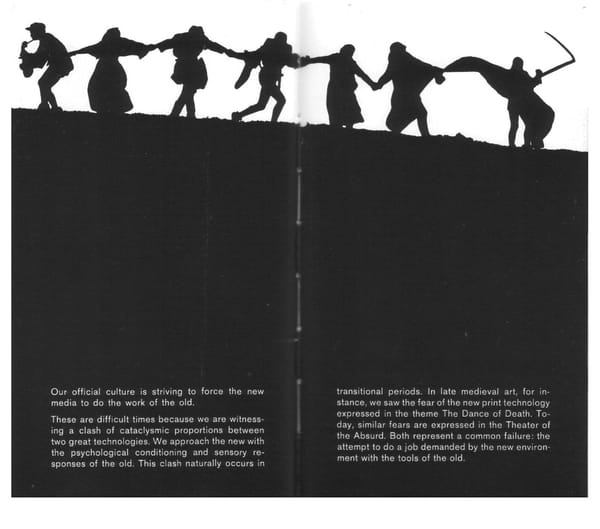
"The thing of it is, we must live with the living." — Montaigne

100 The youth of today are not permitted to approach the traditional heritage of mankind through the door of technological awareness. This only possible door for them is slammed in their faces by a rearview mirror society. The young today live mythically and in depth. But they encounter instruction in situations organized by means of classified information—subjects are unrelated, they are visually conceived in terms of a blueprint. Many of our institutions suppress all the natural direct experience of youth, who respond with untaught delight to the poetry and the beauty of the new technological environment, the environ ment of popular culture. It could be their door to all past achievement if studied as an active (and not necessarily benign) force. The student finds no means of involvement for We now experience simultaneously the dropout himself and cannot discover how the educational and the teachin. The two forms are correlative. scheme relates to his mythic world of electronically They belong together. The teachin represents an processed data and experience that his clear and attempt to shift education from instruction to dis direct responses report. covery, from brainwashing students to brainwash It is a matter of the greatest urgency that our edu ing instructors. It is a big, dramatic reversal. Viet cational institutions realize that we now have civil nam, as the content of the teachin, is a very small war among these environments created by media and perhaps misleading Red Herring. It really has other than the printed word. The classroom is now little to do with the teachin, as such, anymore than in a vital struggle for survival with the immensely with the dropout. persuasive "outside" world created by new informa The dropout represents a rejection of nineteenth tional media. Education must shift from instruction, century technology as manifested in our educa from imposing of stencils, to discovery —to probing tional establishments. The teachin represents a and exploration and to the recognition of the lan creative effort, switching the educational process guage of forms. from package to discovery. As the audience be The young today reject goals. They want roles— comes a participant in the total electric drama, ROLES. That is, total involvement. They do not the classroom can become a scene in which the want fragmented, specialized goals or jobs. audience performs an enormous amount of work.
Arnherst seniors walk out on graduation address by Secretary of Defense Robert McNamara. June, 1966.
107 "The hell of it is those punks pump over fifteen billion dollars into the economy every year." Drawing by Lorenz; © 1966 The New Yorker Magazine, Inc.
The ear favors no particular "point of view." We are enveloped by sound. It forms a seamless web around us. We say, "Music shall fill the air." We never say, "Music shall fill a particular segment of the air." We hear sounds from everywhere, without ever having to focus. Sounds come from "above," from "below," from in "front" of us, from "behind" us, from our "right," from our "left." We can't shut out sound automatically. We simply are not equipped with earlids. Where a visual space is an organized continuum of a uniformed connected kind, the ear world is a world of simultaneous relationships.
113 "The discovery of the alphabet will create forget fulness in the learners' souls, because they will not use their memories; they will trust to the external written characters and not remember of them selves ... You give your disciples not truth but only the semblance of truth; they will be heroes of many things, and will have learned nothing; they will appear to be omniscient and will generally know nothing." Socrates, "Phaedrus" Homer's "Iliad" was the cultural encyclopedia of preliterate Greece, the didactic vehicle that pro vided men with guidance for the management of their spiritual, ethical, and social lives. All the per suasive skills of the poetic and the dramatic idiom were marshaled to insure the faithful transmission of the tradition from generation to generation. These Bardic songs were rhythmically organized with great formal mastery into metrical patterns which insured that everyone was psychologically attuned to memorization and to easy recall. There was no ear illiteracy in preliterate Greece. In the "Republic," Plato vigorously attacked the oral, poetized form as a vehicle for communicating knowledge. He pleaded for a more precise method of communication and classification ("The Ideas"), one which would favor the investigation of facts, principles of reality, human nature, and conduct. What the Greeks meant by "poetry" was radically different from what we mean by poetry. Their "poetic" expression was a product of a collective psyche and mind. The mimetic form, a technique
115 EDUCATION Develop A that exploited rhythm, meter, and music, achieved Powerful the desired psychological response in the listener. Listeners could memorize with greater ease what was sung than what was said. Plato attacked this method because it discouraged disputation and Memory? argument. It was in his opinion the chief obstacle to abstract, speculative reasoning—he called it "a poison, and an enemy of the people." A noted publisher in Chicago reports there is a simple tech "Blind," allhearing Homer inherited this meta nique for acquiring a powerful phorical mode of speech, a speech which, like a memory which can pay you real prism, refracts much meaning to a single point. dividends in both business and social advancement and works "Precision" is sacrificed for a greater degree of like magic to give you added suggestion. Myth is the mode of simultaneous poise, necessary selfconfidence and greater popularity. awareness of a complex group of causes and According to this publisher, effects. many people do not realize how Electric circuitry'confers a mythic dimension on our much they could influence others simply by remembering accurately ordinary individual and group actions. Our tech everything they see, hear, or read. nology forces us to live mythically, but we con Whether in business, at social tinue to think fragmentarily, and on single, separate functions or even in casual con planes. versations with new acquaintances, there are ways in which you can Myth means putting on the audience, putting on dominate each situation by your one's environment. The Beatles do this. They are a ability to remember. group of people who suddenly were able to put To acquaint the readers of this on their audience and the English language with paper with the easytofollow rules for developing skill in remember musical effects—putting on a whole vesture, a ing anything you choose to remem whole time, a Zeit. ber, the publishers have printed full details of their selftraining Young people are looking for a formula for put method in a new book, "Adven ting on the universe—participation mystique. They tures in Memory," which will be; do not look for detached patterns—for ways of re mailed free to anyone who re quests it. No obligation. Send your lating themselves to the world, a la nineteenth name, address and zip code to: century. Memory Studies, 835 Diversey Parkway, Dept. 8183, Chicago, I11. 60614. A postcard will do.
117 Most people find it difficult to understand purely verbal concepts. They suspect the ear; they don't trust it. In general we feel more secure when things are visible, when we can "see for ourselves." We admonish children, for instance, to "believe only half of what they see, and nothing of what they hear." All kinds of "shorthand" systems of notation have been developed to help us see what we hear. We employ visual and spatial metaphors for a great many everyday expressions. We insist on employ ing visual metaphors even when we refer to purely psychological states, such as tendency and dura tion. For instance, we say thereafter when we really mean thenafter, always when we mean at all times. We are so visually biased that we call our wisest men visionaries, or seers! Reminders—(relics of the past)—in a world of the PRINTED wordefforts to introduce an AUDITORY dimension onto the visual organization of the PAGE: all effect information, RHYTHM, inflection, pauses. Until recent years, these EFFECTS were quite elaborate—they allowed for all sorts of CHANGES of type faces. The NEWSPAPER lay out provides more variety of AUDITORY effects from typography than the ordinary book page does.
John Cage: "One must be disinterested, accept that a sound is a sound and a man is a man, give up illusions about ideas of order, expressions of sentiment, and all the rest of our inherited aesthetic claptrap." The highest purpose is to have no purpose at all. This puts one in accord with nature, in her man ner of operation." "Everyone is in the best seat." "Everything we do is music." Theatre takes place all the time, wherever one is. And art simply facilitates persuading one this is the case." They [I Ching] told me to continue what I was doing, and to spread JOY and revolution."
120 Listening to the simultaneous messages of Dublin, James Joyce released the greatest flood of oral linguistic music that was ever manipulated into art. "The prouts who will invent a writing there ulti mately is the poeta, still more learned, who dis covered the raiding there originally. That's the point of eschatology our book of kills reaches for now in soandso many counterpoint words. What can't be coded can be decorded if an ear aye sieze what no eye ere grieved for. Now, the doc trine obtains, we have occasioning cause causing effects and affects occasionally recausing alter effects. Joyce is, in the "Wake," making his own Altamira cave drawings of the entire history of the human mind, in terms of its basic gestures and postures during all the phases of human culture and tech nology. As his title indicates, he saw that the wake of human progress can disappear again into the night of sacral or auditory man. The Finn cycle of tribal institutions can return in the electric age, but if again, then let's make it a wake or awake or both. Joyce could see no advantage in our remain ing locked up in each cultural cycle as in atrance or dream. He discovered the means of living simulta neously in all cultural modes while quite conscious.
123 "Authorship"—in the sense we know it today, indi Xerography—every man's brainpicker—heralds the vidual intellectual effort related to the book as an times of instant publishing. Anybody can now be economic commodity—was practically unknown come both author and publisher. Take any books before the advent of print technology. Medieval on any subject and custommake your own book scholars were indifferent to the precise identity by simply xeroxing a chapter from this one, a of the "books" they studied. In turn, they rarely chapter from that one—instant steal! signed even what was clearly their own. They were a humble service organization. Procuring As new technologies come into play, people are texts was often a very tedious and timeconsuming less and less convinced of the importance of self task. Many small texts were transmitted into vol expression. Teamwork succeeds private effort. umes of miscellaneous content, very much like "jottings" in a scrapbook, and, in this transmission, A ditto, ditto device. authorship was often lost. " " " " The invention of printing did away with anonymity, A ditto, ditto device. fostering ideas of literary fame and the habit of " " " " considering intellectual effort as private property. A ditto, ditto device. Mechanical multiples of the same text created a " " " " public—a reading public. The rising consumer oriented culture became concerned with labels of authenticity and protection against theft and piracy. The idea of copyright—"the exclusive right to re produce, publish, and sell the matter and form of a literary or artistic work"—was born.
125 Even so imaginative a writer as Jules Verne failed Television completes the cycle of the human sen to envisage the speed with which electric tech sorium. With the omnipresent ear and the moving nology would produce informational media. He eye, we have abolished writing, the specialized rashly predicted that television would be invented acousticvisual metaphor that established the dy in the XXIXth Century. namics of Western civilization. Sciencefiction writing today presents situations In television there occurs an extension of the sense that enable us to perceive the potential of new of active, exploratory touch which involves all the technologies. Formerly, the problem was to in senses simultaneously, rather than that of sight vent new forms of laborsaving. Today, the reverse alone. You have to be "with" it. But in all electric is the problem. Now we have to adjust, not to in phenomena, the visual is only one component in vent. We have to find the environments in which a complex interplay. Since, in the age of informa it will be possible to live with our new inventions. tion, most transactions are managed electrically, Big Business has learned to tap the sf writer. the electric technology has meant for Western man a considerable drop in the visual component, in his experience, and a corresponding increase in the activity of his other senses. Television demands participation and involvement in depth of the whole being. It will not work as a background. It engages you. Perhaps this is why so many people feel that their identity has been threatened. This charge of the light brigade has heightened our general awareness of the shape and meaning of lives and events to a level of ex treme sensitivity. It was the funeral of President Kennedy that most strongly proved the power of television to invest an occasion with the character of corporate par ticipation. It involves an entire population in a ritual process. (By comparison, press, movies, and radio are mere packaging devices for consumers.) In television, images are projected at you. You are the screen. The images wrap around you. You are the vanishing point. This creates a sort of inward ness, a sort of reverse perspective which has much in common with Oriental art.
The television generation is a grim bunch. It is much more seriousthan children of any otherperiod —when they were frivolous, more whimsical. The television child is more earnest, more dedicated. Most often the few seconds sandwiched between the hours of viewing—the "commercials"—reflect a truer understanding of the medium. There simply is no time for the narrative form, borrowed from earlier print technology. The story line must be abandoned. Up until very recently, television com mercials were regarded as simply a bastard form, or vulgar folk art. They are influencing contem porary literature. Vide "In Cold Blood,"forinstance.
128 The main cause for disappointment in and for criticism of television is the failure on the part of its critics to view it as a totally new technology which demands different sensory responses. These critics insist on regarding television as merely a degraded form of print technology. Critics of tele vision have failed to realize that the motion pic tures they are lionizing—such as "The Knack," "Hard Day's Night," "What's New Pussycat?" would prove unacceptable as mass audience films if the audience had not been preconditioned by television commercials to abrupt zooms, elliptical editing, no story lines, flash cuts. " When you consider television's awesome power to educate, aren't you thankful it doesn't?" Drawing by Donald Reilly; © 1965 The New Yorker Magazine, Inc.
131 Movies are better than ever! Hollywood is often a fomenter of anticolonialist revolutions. from the show business paper: "Ice Boxes Sabotage Colonialism" Sukarno: "The motion picture industry has pro vided a window on the world, and the colonized nations have looked through that window and have seen the things of which they have been deprived. It is perhaps not generally realized that a refrigera tor can be a revolutionary symbol—to a people who have no refrigerators. A motor car owned by a worker in one country can be a symbol of revolt to a people deprived of even the necessities of life... [Hollywood] helped to build up the sense of deprivation of man's birthright, and that sense of deprivation has played a large part in the na tional revolutions of postwar Asia."
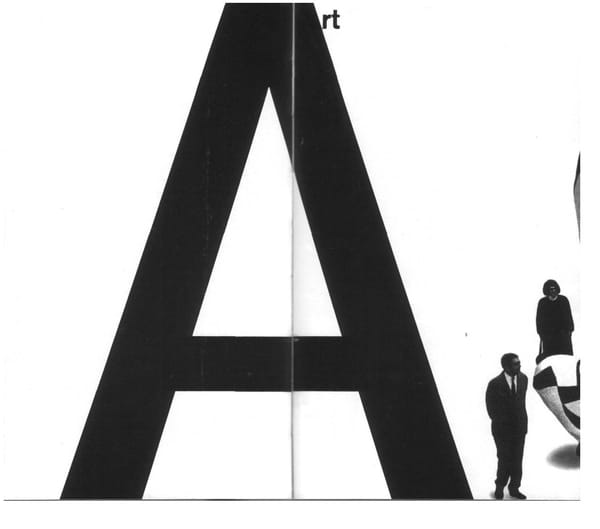
is anything
you can get away with "The biggest and best woman in the world," an 82footlong, 20foothigh sculpture, in Moderns Museet, Stockholm. You can walk around in her. The Balinese say: The Establishment pays "We have no art. homage to four anti We do everything environmental lads. as well as we can." British Prime Minister Museum curator: Wilson visits the Cavern "I wouldn't be seen dead Club in Liverpool where with a living work of art." the Beatles got their A. K. Coomaraswamy: start. The museum has "We are proud of our become a storehouse of museums where we human values, a cultural display a way of living bloodbank. that we have made impossible."
some Lights, camera, no action. like Hollywood is host to Premier Khrushchev. it cold. Real, total war has become information war. It is being fought by subtle electric informational media —under cold conditions, and constantly. The cold war is the real war front—a surround—involving everybody —all the time —everywhere. Whenever hot wars are necessary these days, we conduct them in the backyards of the world with the old technologies. These wars are happenings, tragic games. It is no longer convenient, or suitable, to use the latest technologies for fighting our wars, because the latest technologies have rendered war meaningless. The hydrogen bomb is history's exclamation point. It ends an agelong sentence of manifest violence! some like it hot, 138
"Did you happen to meet any soldiers, my dear, as you came through the woods?"
142 The environment as a processor of information is propaganda. Propaganda ends where dialogue begins. You must talk to the media, not to the pro grammer. To talk to the programmer is like com plaining to a hot dog vendor at a ballpark about how badly your favorite team is playing. " 'See Dick. See Dick protest. Protest, Dick! Protest!'
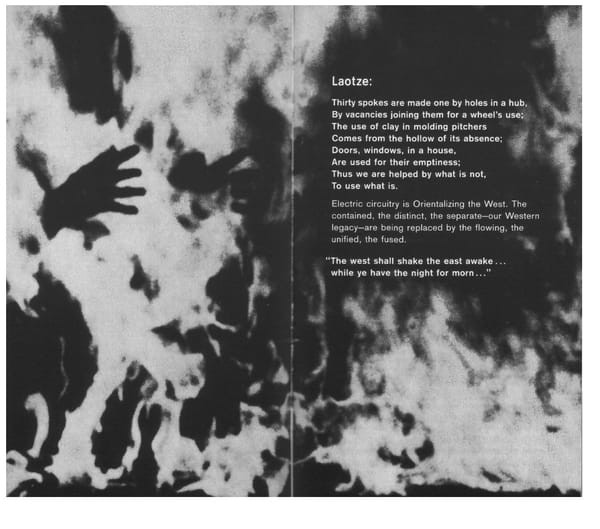
146 The Newtonian God—the God who made a clock like universe, wound it, and withdrew—died a long time ago. This is what Nietzsche meant and this is the God who is being observed. Anyone who is looking around for a simulated icon of the deity in Newtonian guise might well be disappointed. The phrase "God is dead" ap plies aptly, correctly, validly to the Newtonian universe which is dead. The groundrule of that universe, upon which so much of our Western "Only the hand that erases can write the true thing." world is built, has dissolved. —Meister Eckhardt


152 "...and who are you?"
154 "I —I hardly know, sir, just at present—at least I know who I was when I got up this morning, but I think I must have been changed several times since then."
"You see, Dad, Professor McLuhan says the environment that man creates becomes his medium for defining his role in it. The invention of type created linear, or sequential, thought, separating thought from action. Now, with TV and folk singing, thought and action are closer and social involvement is greater. We again live in a village. Get it?" Drawing by Alan Dunn.; © 1966 The New Yorker Magazine, Inc.
Page 1: A trademark is printed on a raw egg yolk by a nocontact, 159 nopressure printing technique. Imagine the possibilities to which this device will give birth ! Front cover: Peter Moore. 96: Ute Klophaus. 1: Eugene Anthony, for Newsweek. 97: Joseph Stanley. 23: United Press International, Inc. 9899: Peter Moore. 45: Peter Moore. 101: Culver Pictures. 9: Anthony Petrocelli, for ArtCarved. 102103: Wide World Photos, Inc. 1516: Peter Moore. 104106: Jerrold N. Schatzberg, for Columbia Records. 1920: The Advertising Council, Inc. 105: © 1965 by M. Witmark &. Sons. 2122: PhotoPeter Moore. Used by Permission. 2324: The Art Institute of Chicago. 108109: Steve Schapiro. 2731: Peter Moore. 112: Museum of Fine Arts, Boston —Pierce Fund; 3233: Peter Moore. Glyptotheque NY Carlsberg. 3435: Peter Moore. 115: Memory Studies. 3637: Peter Moore. 116: Peter Moore. 3839: Peter Moore. 118: Bell Telephone Laboratories. 4647: General Dynamics, Convair Div. 119: Harvey Gross —Creative Images. 51: The Pierpont Morgan Library. 121: PhotosPeter Moore. 5253: Formerly KaiserFriedrich Museum, Berlin. 124: "Hier et Demain," published by J. Hetzel, Paris, 5657: Peter Moore. 1910 ©. Selection title: "Au XXIX Siecle; 5860: Chas Moore, Black Star. La Journee d'un Journaliste Americain en 2889." 62: Peter Moore. par Jules Verne —Coll. Claude Kagan. 6465: Radio Corporation of America. 126127: United Press International, Inc. 6667: N. R. Farbman, for Time, Inc. 129130: Chas Moore, for Black Star. 70: Robert J. Day. 131: Variety. 71, 73: Photo —David Plowden; Painting 133136: Tiofoto Bildbyra. New York Public Library. 137: United Press International, Inc. 7475: PhotoPeter Moore. 139: CBS News. 77: Peter Moore. 142: MortGerberg. 78: Tony Rollo, for Newsweek. 143145: Wide World Photos, Inc. 79: Bernard Gotfryd, for Newsweek. 146: Division of Radio, Television and AudioVisuals, 8081: United Press International, Inc. United Presbyterian Church in the United States 8283: Otto C. Prinz. of America. 8687: Otto C. Prinz. 148149: © 1965, by The New York Times Co. 89: William Woodman. Reprinted by permission. 90: PhotoPeter Moore. 150151: United California Bank, Los Angeles, 91: PhotoCulver Pictures. California. 93: Culver Pictures. 160: Wide World Photos, Inc. 9495: Janus Films. Back cover: Yousuf Karsh
